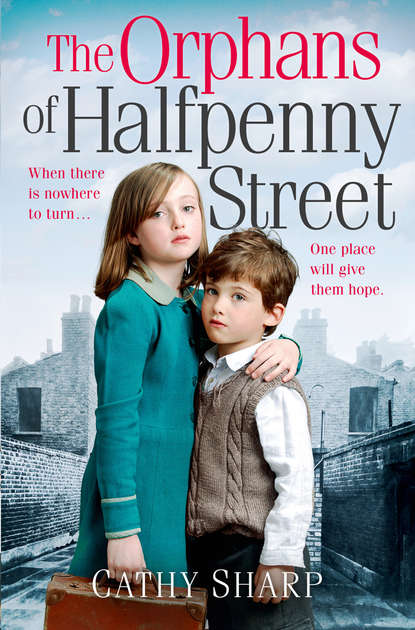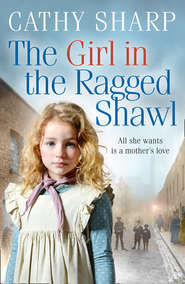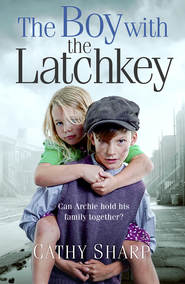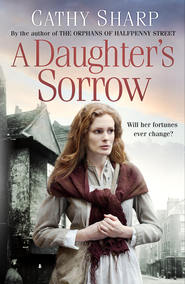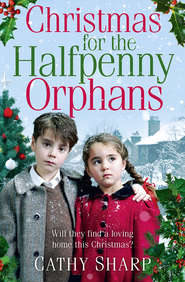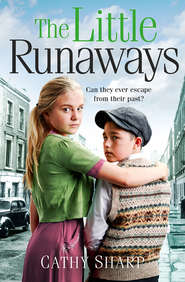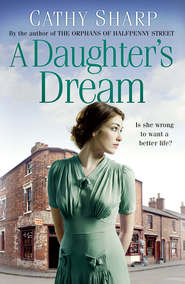По всем вопросам обращайтесь на: info@litportal.ru
(©) 2003-2024.
✖
The Orphans of Halfpenny Street
Настройки чтения
Размер шрифта
Высота строк
Поля
In the semi-darkness, Mary Ellen hugged herself, tears trickling down her cheeks. She didn’t want to be sent away; she wanted to be with her mother and look after her. Forgetting that she was supposed to be in bed, she jumped up and rushed into the kitchen, temper flaring.
‘I won’t go away and nor will Ma,’ she cried. ‘You’re mean, Rose O’Hanran. I hate you.’
‘Oh, Mary Ellen, love,’ her mother said. ‘You should be in bed. You don’t understand. Rose is only trying to help us. I can’t look after you properly … you would be better in St Saviour’s, if they’ll take you.’
‘I’ll go round and ask Father Joe if he thinks they’ll take her,’ Rose said. She looked at Mary Ellen in the yellowish light of the gas lamps and sighed. ‘Your hair could do with a wash, child. Come here, and I’ll do it before I go and see Father Joe.’
Grabbing Mary Ellen’s arm and ignoring her protests that she’d washed her own hair only two days previously her sister filled a jug with water from the kettle and added cold, then bent Mary Ellen’s head over the sink and poured the water, rubbing at her hair and scalp with the carbolic soap they used for everything.
‘Your neck is as black as ink …’
‘Liar! I washed it this week …’ Mary Ellen retorted.
‘Well, you didn’t make much of a job of it.’
‘I hate you, Rose.’
‘Stop quarrelling, the pair of you,’ Ma said wearily.
‘I shan’t come back when I’ve been to see Father Joe,’ Rose said as she rubbed at Mary Ellen’s head, her nails scratching as she bent to her task. She poured out the rest of the jug, washing away the soap and making Mary Ellen gasp because it was too cold and the soap stung her eyes. ‘I need to get some sleep and I’ve got to work on my revision every day. I don’t want to fail my exams after all the work I’ve put in …’
Mary Ellen’s eyes watered. She didn’t want Rose to come back home, because in that moment she hated her. Rose was selfish and mean and they didn’t need her, because Mary Ellen could look after her mother.
Rose was giving her hair a rough rub with the towel. Next, she took a comb and began to pull the teeth through the long hair, making Mary Ellen yell because it tangled and hurt her.
‘Don’t make such a fuss,’ Rose said crossly. ‘You’re not a baby.’
‘I can do it myself,’ Mary Ellen said. ‘You’re a brute and a bully, Rose. Just go back to nursing and leave us alone. I’ll look after Ma.’
Rose looked at her and her face softened a little. ‘You’re not old enough, love,’ she said in a kinder tone. ‘You’ve done your best, Mary Ellen, but you’re not nine yet and you need to go to school. Ma told me how you make her a cup of tea before you go and do as much of the work as you can when you get back – but you’re missing school and Ma will be in trouble if it continues. I’m sorry, but you will have to go into a home – just until Ma is better. You do want her to get better?’
‘Yes.’ Mary Ellen looked at her mother in alarm. ‘Ma … I don’t want to go to that place …’
‘I know you don’t, love. Come here.’ Her mother held out her arms. ‘I don’t want to go away either, but Rose is right. I am ill and if I stay I could make you ill too – so they will make me go soon even if I try to stay. You do as Rose says. Rose, give me that comb.’ She took it and began to smooth it through Mary Ellen’s hair without pulling anywhere near as much. ‘You get off, Rose. I’ll see the doctor tomorrow and make arrangements to go to that hospital … and you can ask at St Saviour’s if they’ll take our Mary Ellen …’
Mary Ellen’s throat was tight and painful, but she knew it was useless to resist. Ma’s illness was getting worse all the time and neither of them had enough food to eat. It was summer now but in the winter this damp old house would make Ma’s chest even worse.
Holding back her tears, she bowed her head, accepting defeat. ‘I’ll do what you want, Ma,’ she said.
‘There’s my good girl,’ her mother said and kissed the top of her head. ‘I’ll put some milk on and we’ll have a cup of the cocoa Rose brought us. It was good of her, wasn’t it?’
Mary Ellen nodded. ‘Yes, I like cocoa.’
‘You like ham too,’ Rose said and smiled at her. ‘When I come on my day off I’ll bring some ham and tomatoes. You’ll like that, won’t you?’
Ham was a rare treat these days, because even if you had the money it was hard to find in the shops, but the manager of Home and Colonial, the grocers where Rose had worked until she left to train as a nurse, had a soft spot for his former employee and he would find her a couple of slices.
‘Yes, I’ll like that,’ Mary Ellen agreed, but a slice of ham and tomatoes wouldn’t make up for the way she was being cast out of her home … it wouldn’t take away the grief of losing her mother and not knowing if she would ever see her again.
‘Wotcha! Lovely day, ain’t it?’
Mary Ellen O’Hanran ignored the cheery greeting as the delivery boy whizzed by her on his shop bicycle. Ma would say he was common and tell her to ignore the likes of Bertie Carter. Even though they were forced to live in the dirty little houses crammed close to the Docks, they did not have to lower their standards.
‘You know better, Mary Ellen, and don’t you forget it. We may live here, but we came from better things and one day we’ll be back where we belong,’ her mother had used to say when they first came to Dock Lane, but that was nearly four years ago, just after her father had died and her mother had still been fit and healthy.
Even the last rays of a late summer sun could not cheer the grime of the dingy street, its narrow gutters choked with rubbish. Peeling paint on the doors of terraced houses and windows that were almost uniformly filthy from the dirt of the slums were at odds with the spotless white lace curtains at number ten Dock Lane. A scrawny tabby arched its back and hissed at a scavenging rat amongst the debris, and the cheeky delivery boy whistled loudly as he swerved to avoid two snarling dogs fighting over a scrap of food further down. He waved as he turned the corner of the narrow lane, before disappearing out of sight. Mary Ellen stared after him, a small, lonely figure with her fair hair curling about a thin, pale face in wayward wisps that had escaped from her plait.
A single tear trickled from the corner of her eye but she dashed it away with her hand, refusing to give in to the feeling of misery that kept threatening to overcome her, because Ma had shouted and told her to keep out of the way. Ma never shouted, but she was so tired, at the end of her tether. She was lying down on her bed after another bout of terrible coughing, her face so pale and drawn that Mary Ellen was afraid she might collapse again. In the distance, the towering cranes on the East India Docks and the smoking chimneystacks of merchant vessels out on the river were outlined against a clear sky. The sound of a ship’s horn blasted suddenly through the mean streets and the foul stench from the oily water had worsened with the heat of the day. The noise of the trams clanging their way through the main thoroughfare echoed in the stillness of the unusually quiet lane. For once there were no gossiping women standing at their front doors, the heat having driven them all inside, thick lace curtains closed to shut out what had been a relentless sun.
Mary Ellen’s home stood out from the crowd, because until these last few weeks, when she’d got so ill, Ma had kept her doorstep scrubbed and her curtains washed despite the constant struggle against the filth of the East End of London. Mary Ellen had scrubbed the step herself this morning, and Ma told her it looked lovely, but the soap had stung her hands and her knees hurt where she’d grazed them on the stone. Yet Mary Ellen would do it again tomorrow, because Ma had been used to better and her pride made her battle against the poverty and wretchedness of her surroundings.
Hunting for the right kind of stone, Mary Ellen was set on playing a game of hopscotch to while away the hours until Rose came home as she’d promised, and it was time to go in for her tea. Maybe one of the other children in the lane would come and play with her, though because Ma kept herself to herself, her neighbours thought they were stuck up and the other kids often refused to notice the O’Hanran girl.
‘Who does she think she is, with her airs and graces?’ their mothers whispered to each other when Ma put her spotless washing out to dry in the back yard. Hair in wire curlers peeping out beneath their headscarves, they made faces at the woman whose hair shone like silk and wore no apron over her dress when she came into the street. ‘Just because her father owns a shop over the river she needn’t think she’s better than the rest of us.’
Mary Ellen bet some of them were gloating to see her mother’s pride tumbled in the dust and tears of anger stung her eyes when she thought of what was going to happen when Rose came home. She knew where she was going, because she’d passed St Saviour’s on her way to visit the park with her school, St Mary’s. There she’d seen the St Saviour’s girls, all dressed in grey skirts, white blouses and dark red coats.
The other kids at St Mary’s laughed and pointed at the orphans, calling them the ’Alfpenny kids, because that was the name of the street the home was in, and now Mary Ellen was going to be one of them. The idea filled her with dread.
Why couldn’t she stay at home? Rebellious thoughts filled her head, though sometimes, her mother looked so pale and fragile that Mary Ellen grew frightened. When she saw the blood on the handkerchief that Ma tried to hide, she prayed to that God in the sky her father had impressed on her was there to save them, especially little children.
‘Ah, whist, me darlin’,’ Tom O’Hanran would say, as he sat her on his knee and stroked her head, his breath always smelling faintly of good Irish whiskey. ‘Sure, Jesus in His heaven and Mary Mother of God will smile on you, my Mary. You’ve the charm of the Irish and the smile of an angel, and no one could help but love you.’
‘Now then, Tom O’Hanran.’ Ma would smile fondly on them. ‘Don’t you be spoiling her with your daft stories. Mary Ellen has to learn that life does not always flow smoothly for the likes of us.’
Mary Ellen still missed her father. Sometimes it hurt so much that it was like a big hole in her chest, but Ma didn’t talk about him so she had to keep her grief inside.
Ma was English, not Irish, and in the opinion of her shopkeeper father she had disgraced herself by marrying a wild Irish Catholic, who would, he prophesied, ruin her. Ma had been in love with her handsome husband in those days, and she’d even converted to his faith at the start, though after his death she had lapsed and no longer sent her children to the Catholic Church. Ma seldom went to church at all, but when she did, she chose the Methodist one because the minister did not scold her for changing her mind over the matter of religion. In a huge city teeming with people of all faiths, the minister had long grown used to accepting those in need, whatever their denomination, and did what he could to help the poor of the area, regardless of whether they attended his church.
Ma’s father had disowned her when she married, and he had not relented when she became a widow, even though he could have helped her to stay in the nice little cottage she’d gone to when she wed. Mary Ellen’s elder sister Rose said that Grandpa would’ve given Ma money if she’d grovelled and begged him, but Ma was too proud to beg. Instead, she’d been forced to come here to this slum and fight her battles against an encroaching illness and the tide of dirt that threatened to engulf them.
Rose still attended the Catholic Church, not out of devotion but because, she said, they had allowed her to take a scholarship under their aegis that had enabled her to enter nursing college. Rose was determined to better herself, to make a good life, and her only way of getting the chance she needed had been to take advantage of being a good Catholic. Father Joe had been a friend to all of them and he took an interest in Rose’s future, telling Ma that she should be proud of her daughter’s hard work.
‘You’ve a good daughter there, Mrs O’Hanran,’ he’d said when he came to visit. ‘Respectable and devout, she’ll make a wonderful nurse.’
Ever since she was Mary Ellen’s age, Rose had dreamed of becoming a nurse one day, and the recent terrible war which had ended only two years earlier had made her even more eager to take up the profession.
‘When I see men fresh home from the war, with legs missing and awful scars, some of them so weak that they will never recover, I want to help them,’ Rose had told her young sister. ‘I only wish I had been old enough to go out to the Front – somewhere the fighting was at its worst – to help nurse the men. I could never work in an office or a dress shop when there is something more worthwhile to be done. Hitler is beaten, and London will recover from the Blitz in time, but the injuries some of those men received will never be healed.’
Rose wanted to help sick people, but she hated the slum area they’d been forced to live in after Pa died, and Mary Ellen knew she wanted to become a nurse so that she need never come back here. She was ashamed of their home and wanted something better. Mary Ellen didn’t care about such things, she just wanted to be at home with her mother … but after today she would be sent away and she wouldn’t be able to see or touch Ma …
Mary Ellen had often sat unseen on the stairs in the evenings and listened to her mother and sister talking in the kitchen. At nights, Ma lit the gas lamps and made a pot of tea, which they drank together, discussing subjects that they considered her too young to comprehend, but life hadn’t been easy since Pa died, and Mary Ellen understood grief all too well. She heard things that worried her, though she often made sense of only a fraction.
Yet she knew that Britain was still struggling to pay back its war debts and there were not enough decent jobs for able-bodied men, let alone those who could not do a full day’s work.
Everyone had hoped rationing would end with the war, but instead it seemed that every month they were told there would be less of something else. ‘Only one ounce of bacon per person per week now, and three pounds of potatoes,’ Ma complained when Rose came home with whatever she could find. ‘We shall all starve before they’ve done – and what was it all about, that’s what I’d like to know.’
‘Governments falling out like spoiled children,’ Rose said in a harsh tone. Ma sometimes complained that Rose was becoming a radical and too critical of politics and things that were best left to men, but that just made Rose toss her head and retort, ‘You’ll see, Ma. Women are going to have more to say in the future. It’s time ordinary people had enough to eat and decent homes to live in – it’s time women were equal to men, in wages and everything else.’





